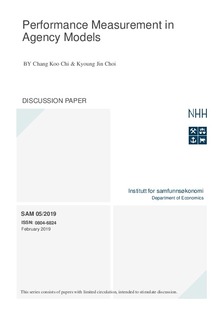| dc.contributor.author | Chang Koo, Chi | |
| dc.contributor.author | Kyoung Jin, Choi | |
| dc.date.accessioned | 2019-02-27T11:36:39Z | |
| dc.date.available | 2019-02-27T11:36:39Z | |
| dc.date.issued | 2019-02-25 | |
| dc.identifier.issn | 0804-6824 | |
| dc.identifier.uri | http://hdl.handle.net/11250/2587776 | |
| dc.description.abstract | This note explores how to evaluate an agent’s performance in standard incentive contracts. We show that the MPS criterion proposed by Kim (1995) becomes a tight condition for one performance measurement system to be more informative than another, as long as the first-order approach can be justified. In the one-signal case obeying the monotone likelihood ratio property, the MPS criterion is equivalent to the way of ordering signals developed by Lehmann (1988), establishing a link to statistical decision theory. Our results demonstrate that depending on the agent’s potential deviations, ideal performance measures can be different. | nb_NO |
| dc.language.iso | eng | nb_NO |
| dc.publisher | Institutt for samfunnsøkonomi | nb_NO |
| dc.relation.ispartofseries | DP SAM;05/2019 | |
| dc.subject | Agency problems, performance measurement, informativeness criterion, signal orderings | nb_NO |
| dc.title | Performance Measurement in Agency Models | nb_NO |
| dc.type | Working paper | nb_NO |
| dc.subject.nsi | Samfunnsvitenskap | nb_NO |
| dc.source.pagenumber | 22 | nb_NO |
